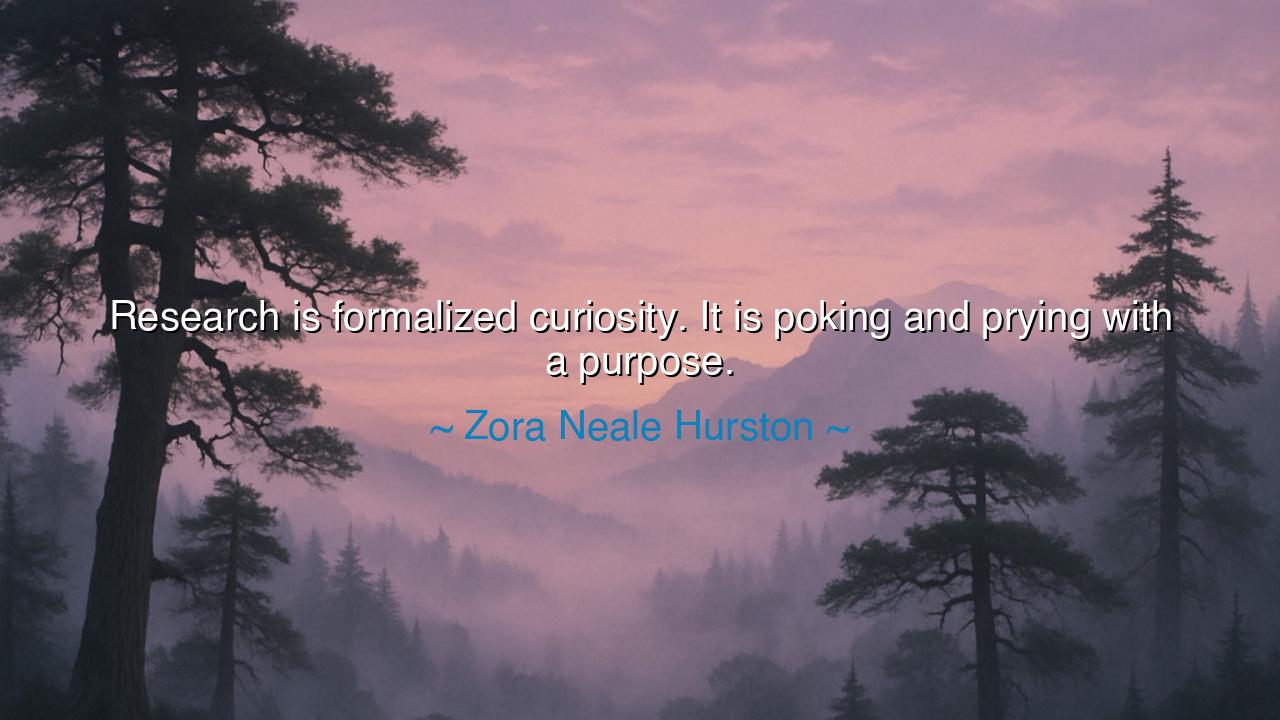
Research is formalized curiosity. It is poking and prying with a






The brilliant writer and anthropologist Zora Neale Hurston, daughter of the Harlem Renaissance and student of human truth, once wrote: “Research is formalized curiosity. It is poking and prying with a purpose.” These words, simple yet profound, capture the sacred fire that drives all discovery. For curiosity is the spark of the human spirit—the restless hunger that makes the heart ask, Why? How? What if? But when that curiosity is disciplined, focused, and guided by intention, it becomes research—the noble art of seeking knowledge not for vanity, but for understanding. Hurston saw that every great discovery begins as wonder, but wonder must be given direction to bear fruit.
To poke and pry with a purpose is to look upon the world not with idle fascination, but with an active will to uncover its truths. The lazy gaze sees only the surface; the curious mind looks deeper, turns the stone, studies the shadow, and asks what lies beyond. Yet curiosity alone, unshaped, is a wandering flame—it burns brightly but without form. Hurston teaches that research is curiosity tamed into mastery, a disciplined art where wonder becomes method and passion becomes pursuit. It is the transformation of impulse into insight, of question into wisdom.
Hurston herself lived these words. Born in the South, in the town of Eatonville, she rose from humble beginnings to become one of the most powerful voices of her age. She was not content to write about life from afar; she journeyed into the heart of her people to record their songs, their stories, their spirit. With notebook and ear attentive, she researched the rhythms of the African American soul—the folktales whispered on porches, the hymns sung in fields, the laughter and language that carried generations through suffering and joy. Her curiosity was not idle; it was a sacred duty. She did not merely “poke and pry,” she sought to preserve, to understand, to honor the voices that history had tried to silence.
In her time, many looked upon her work as unconventional—too personal, too passionate to be called science. But Hurston understood that true research is not sterile; it lives and breathes. To study something deeply, one must love it, must feel its pulse and its pain. The cold investigator may collect facts, but the warm-hearted seeker gathers truth. Thus, her “poking and prying” was not intrusion, but reverence—a reaching into the heart of her people to bring their truth to light. Through her, curiosity became a bridge between worlds, and purpose gave that bridge strength to endure.
History gives us other examples of such purposeful curiosity. Think of Marie Curie, who, driven by a question few dared to ask, delved into the mysteries of invisible rays. Her curiosity led her to discover radium and polonium—forces hidden in the very bones of the earth. But her curiosity was no aimless wonder; it was formalized through years of labor, danger, and discipline. She risked her life in pursuit of knowledge, guided not by idle interest but by purpose—the belief that her work could advance humanity. In her, as in Hurston, curiosity found its form, and form gave birth to greatness.
The ancients knew this truth as well. In the temples of Greece, the philosophers taught that curiosity was a divine spark given by the gods, but only through reason—the ordering of thought—could it lead to enlightenment. To “research” was to follow the thread of the unknown through the labyrinth of the world, guided by purpose so that one might not lose the way. In every age, from the scholars of Alexandria to the explorers of the New World, it has been purpose that separates the dreamer from the discoverer, the seeker from the sage.
So let this be your lesson: Do not let your curiosity sleep, but neither let it wander without aim. Ask your questions, but ask them with heart and direction. When something fascinates you, do not merely look—study. Do not simply wonder—seek. Write it down. Test it. Explore it. Let your curiosity take shape, and your thoughts take root. For curiosity without purpose is a spark lost to the wind; but curiosity with purpose becomes a fire that can light the world.
Thus, remember Hurston’s wisdom: “Research is formalized curiosity.” To poke and pry with a purpose is to live awake—to move through the world as both student and discoverer, humble enough to ask, yet brave enough to seek. The wise do not wait for knowledge to come—they chase it with the vigor of the soul, until wonder itself becomes understanding. Drink deeply of curiosity, but give it form, and your life will become a journey of endless discovery and meaning.






AAdministratorAdministrator
Welcome, honored guests. Please leave a comment, we will respond soon